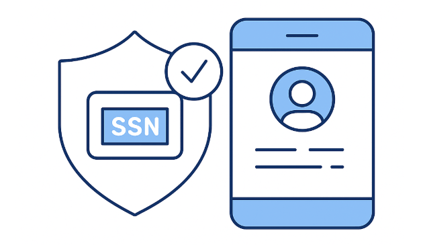SSN validator – privacy-safe social security number verification
Verifying Social Security Numbers (SSNs) is one of the most effective tools in detecting identity fraud, false claims, and synthetic identities.
A privacy-safe SSN validator changes this model. It enables institutions to verify SSN authenticity and match it against trusted data sources — such as tax authorities or identity registries — without exposing or transferring personal data.
This new approach combines regulatory compliance, fraud prevention, and privacy protection in a single process.
Why SSN validation matters for compliance
Incorrect or stolen SSNs are one of the most common triggers of financial crime investigations.
Key objectives of SSN validation include:
- Identity verification: confirming that the SSN matches the individual’s personal data.
- Fraud detection: identifying duplicate or false numbers used in account creation.
- AML and CTF compliance: ensuring customer identities meet FATF-aligned standards.
- Preventing identity theft: protecting individuals from impersonation and unauthorized use.
Related: See Customer Due Diligence (CDD) for how identity verification supports AML risk management.
How privacy-preserving SSN validation works
Instead of sending personal data to a central database, both the verifier and the source institution perform encrypted computations that confirm whether the SSN is valid and correctly matched.
Core features include:
- Encrypted data exchange: SSNs and personal identifiers never leave their secure environments.
- Cross-agency collaboration: multiple authorities can validate authenticity using encrypted matching.
- Immutable verification trails: every validation creates a verifiable, tamper-proof record.
- Compliance with GDPR and U.S. data privacy laws: no personal data exposure during verification.

Integration with digital ID and financial systems
When integrated into Decentral identity and ID Verification (IDV) frameworks, it ensures that identity credentials are authentic before being issued or accepted.
Financial institutions can embed SSN validation into:
- Onboarding and KYC workflows: automated verification during account creation.
- Transaction Risk Scoring: cross-checking identities in suspicious activity reviews.
- Fraud monitoring systems: linking SSN integrity with transaction behavior.
- RegTech solutions: using validation outputs to support automated regulatory reporting.
Related: Read Decentral identity for how user-controlled credentials integrate with privacy-safe validation.
Are your business at risk of failing the FCA
FCA’s blockchain-enabled data strategy aims to save up to £4 billion in annual compliance costs source. Implementing Partisia’s MPC framework reduces duplication in cross-bank fraud checks.

What's inside?
-
Competitors & why Partisia prevails
-
Why Partisia exceeds industry alternatives
-
ROI & value proposition
-
Next step
and more...
Challenges and regulatory alignment
The key challenges include:
- Legacy integration: older financial systems can’t process encrypted validation workflows.
- Jurisdictional barriers: varying rules on SSN use and data sharing.
- Privacy concerns: balancing U.S. SSN practices with EU data protection laws.
- Verification latency: cryptographic validation can be slower than centralized checks.
“A privacy-preserving SSN validator gives regulators what they want — assurance of authenticity — without the privacy trade-offs that have undermined centralized databases.”
– Mark Medum Bundgaard, CPO, Partisia
This viewpoint highlights the direction regulators are moving: privacy and verification are no longer competing goals.
Advancing privacy-first SSN verification
By applying Multi-Party Computation (MPC) and Privacy-preserving Computing, financial institutions and government agencies can confirm identity integrity without exposing or transferring personal data.
With Partisia, organizations can:
- Validate SSNs across multiple registries securely.
- Detect synthetic identities through encrypted cross-matching.
- Integrate validation into AML and fraud monitoring workflows.
- Prove regulatory compliance with verifiable, privacy-preserving audit trails.
About Partisia
We are an innovative software company and a trusted partner empowering companies to compute on encrypted data. Providing a platform where data from individuals, governments and private companies are able to stay encrypted and protected, and still fully enabled. Partisia is founded by pioneers within Multi-Party Computation and advanced cryptography.


2025.10.16

.png?width=520&height=294&name=confidential-computing-techniques%20(2).png)
